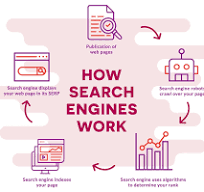Search Engine Optimization, commonly known as SEO, is the art and science of optimizing websites to improve their visibility on search engine results pages (SERPs). By aligning your website with the algorithms and ranking criteria used by search engines like Google, SEO helps drive organic (unpaid) traffic to your site. Let’s explore the key aspects of SEO, its importance, and how it works.

Why is SEO Important?
SEO is essential for businesses and individuals looking to increase their online presence. Here’s why:
- Increased Visibility: Higher rankings on SERPs mean more exposure to potential visitors.
- Credibility: Users trust websites that appear on the first page of search results.
- Cost-Effective Marketing: SEO brings organic traffic without paying for ads.
- Improved User Experience: A well-optimized website ensures faster load times, mobile compatibility, and relevant content.
How Do Search Engines Work?

Search engines like Google use bots to crawl websites, index content, and determine rankings. The process involves:
- Crawling: Bots scan the web to discover new and updated content.
- Indexing: The crawled data is organized and stored in a database.
- Ranking: Algorithms evaluate indexed content based on factors like relevance, quality, and user intent.
Key Components of SEO:
- On-Page SEO : This focuses on optimizing individual web pages for better rankings. Key practices include:
- Keyword Optimization: Use relevant keywords naturally in content.
- Meta Tags: Write compelling meta titles and descriptions.
- URL Structure: Create clean, descriptive URLs.
- Content Quality: Publish informative, engaging, and original content.
2. Off-Page SEO: Off-page SEO strengthens your website’s authority through external activities like:
- Backlink Building: Gain links from reputable sites.
- Social Media Sharing: Promote content on platforms like Facebook and Twitter.
- Brand Mentions: Increase online discussions about your brand.
3. Technical SEO: This aspect ensures that search engines can effectively crawl and index your site. Key elements include:
- Site Speed: Improve loading times for better user experience.
- Mobile Optimization: Ensure responsiveness on all devices.
- Sitemap and Robots.txt: Help search engines navigate your site.
Best Practices for SEO Success :
- Conduct thorough keyword research to target user intent.
- Optimize content for readability and engagement.
- Build a mobile-friendly and secure (HTTPS) website.
- Regularly monitor website analytics and performance.
- Keep up with search engine algorithm updates.
SEO is a crucial tool for enhancing your online presence and driving organic traffic. By mastering on-page, off-page, and technical SEO, you can ensure your website ranks higher on search engines while providing value to users. Whether you’re a beginner or an expert, investing in SEO is a step toward long-term success in the digital world.